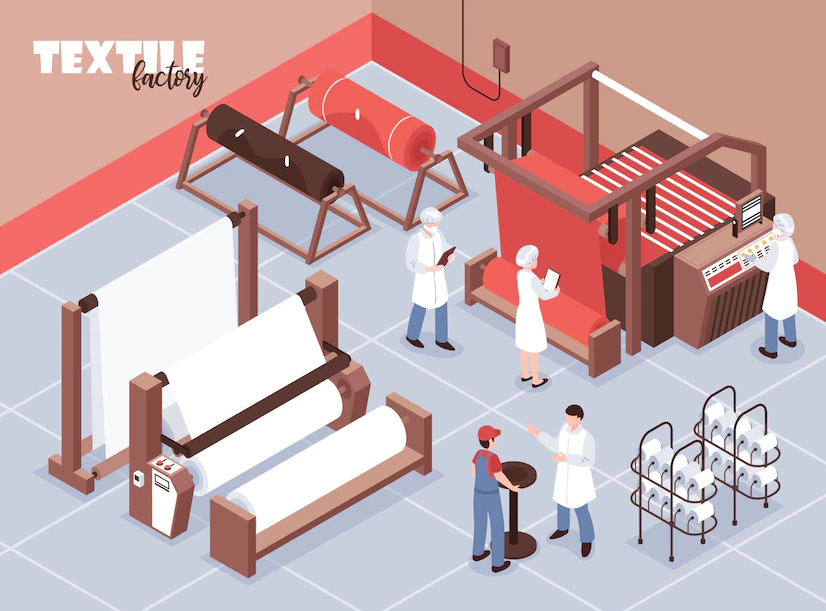Significance of ERP in the Garment Manufacturing Process

Most of the top retail companies are prone to the whims of the market and evolving consumer demands. If a company is unable to adapt according to these changing demands, it may fail to stay abreast of the competition.
The Indian textile and apparel industry is expected to reach a whooping US$190 billion by 2025-26. India is the third-largest textile manufacturing industry and is responsible for more than 4% of the total textile production globally. In this landscape of immense growth potential, intense competition, and rapidly changing trends, garment companies are in need of retail technology to simplify their manufacturing processes.
They need to adopt innovative retail business solutions to ride the growth wave and not be left behind. An Enterprise Resource Planning (ERP) system is a holistic solution for increasing efficiency and reducing manufacturing losses. ERP is useful for monitoring supply and demand for different products, ensuring that manufacturing costs are kept down, and inventory stocks don’t run out.
This blog talks about the challenges faced by the garment industry and how ERP can help resolve them.

Challenges in the Garment Industry
In the past few years there have been many disruptions in the garment industry and most manufacturing companies have been unable to keep up. The key challenges faced by the industry are:
Lack of integration: Each department in the apparel manufacturing process has its own software and systems, which makes it hard to ensure data integrity across the board.
Lack of automation: The apparel manufacturing industry relies largely on manual processes and human labor, resulting in high costs and low efficiency.
Lack of transparency across the supply chain: Most apparel manufacturers don’t have visibility into operations across the supply chain. Maintaining and syncing inventory and avoiding deadstock requires smart retail solutions.
Inability to meet consumer demand: In today’s fast-paced world, apparel manufacturers need a retail business solution to understand, predict consumer behavior and streamline their production line.
Can the industry jump through these hoops?
The top retail fashion company in the world, Shein was the second most downloaded app in the world in 2021, clocking a 100% growth in each of the past 8 years. Its website ranks first for web traffic in the apparel category. How is Shein revolutionizing the apparel industry and taking the world by storm?
The secret recipe behind the brand’s consistent growth story is seamless integration of their systems with ERP. According to a recent report, every area of their website is tied to the ERP system. Over 300 manufacturing units are connected through a single cloud software allowing them to keep track of each order. They haven’t missed a single missed order in the past 8 years. In fact, their supply chain cycle is so impeccable that their supply chain cycle time is just 3 days, putting them far ahead of their global competitors.
Why ERP is Important to the Garment Manufacturing Industry
ERP systems are critical to coordinating business processes across an entire organization, from sales and marketing to manufacturing and distribution. These are the key ways through which an ERP system can help the garment manufacturing industry overcome its challenges
Increased efficiency of inventory management
Businesses need to keep track of their inventory to ensure that they have enough supplies to meet customer demands and to ensure that they don't run out of stock.
ERP simplifies inventory management. It synchronizes operations such as stock purchase, status of items and orders. ERP enables seamless communication between various departments, ensures better decision making and minimizes losses in the form of deadstock or delayed orders.

Reduced operational costs
ERP allows all financial transactions to be carried out on instantly with no delays or errors, regardless of how many branches your business has across the globe. Centralizing various functions to one system leads to increased productivity and lower costs. According to Forbes, ERP can bring down operational costs by 15% and achieve 60% higher operational efficiency.
Improved customer service
Customers are the lifeblood of a business and customer service is integral to its success. An effective ERP system can help your business keep pace with a rapidly shifting marketplace by improving your customer relationship management (CRM) efforts.
For instance, when a customer orders an item, an ERP will track the order through the various steps in each stage of production. Customer representatives can immediately intervene if there are issues.
Having an ERP in place facilitates customer service with faster deliveries, fewer errors, and better customer outreach.
Easy Handling of Payments and Receipts
Companies using an ERP system can generate accounting reports that show from monthly financial trends to specific purchases by individual employees. This detailed information can help companies make strategic decisions about areas where they need to cut costs and where they should be spending more money. Whether it is invoicing, tracking customer payments or payouts on raw material, the ERP system handles all these processes with minimum human intervention.
Better data analysis and reporting
One of the biggest challenges in data analysis is that too often, information is siloed in different departments across an organization. The centralization of the systems of all departments into one ERP system helps in eliminating errors.
When all the relevant information is available with the click of a mouse, businesses can easily identify inefficiencies and make quick changes to manufacturing processes to fix potential problems before they derail their operations. The streamlined nature of data analysis drives companies to make better business decisions and predictions for the future.
One-stop Solution for Garment Manufacturing Needs
Ginesys ERP is an ideal solution for the garment manufacturing industry. It manages all aspects of the retail business, ranging from sales and purchase to production, accounts and inventory management. Our ERP software helps streamline the processing of complex orders, reduce inventory loss, improve productivity, increase accuracy of your business operations and optimize costs.
It is an agile and scalable product suited for businesses of different sizes looking to accelerate their growth. Ginesys has decades of experience in offering a complete suite of integrated modules designed to meet the ever-evolving needs of the industry and help you stay ahead of the game.
Like 1200+ businesses, if you want to fast track your growth with Ginesys, Get in touch with us Now!






